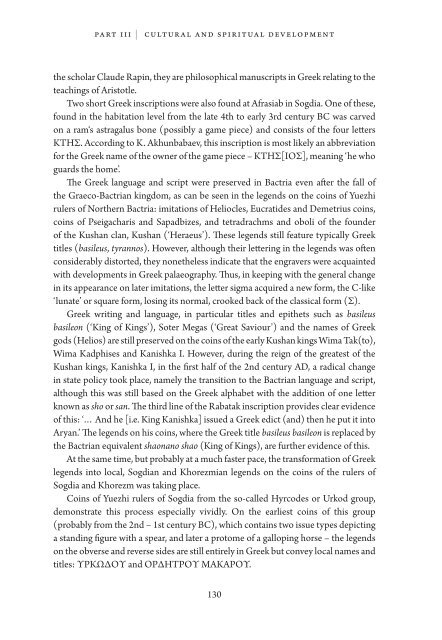You also want an ePaper? Increase the reach of your titles
YUMPU automatically turns print PDFs into web optimized ePapers that Google loves.
part iii | cultural and spiritual development<br />
the scholar Claude Rapin, they are philosophical manuscripts in Greek relating to the<br />
teachings <strong>of</strong> Aristotle.<br />
Two short Greek inscriptions were also found at Afrasiab in Sogdia. One <strong>of</strong> these,<br />
found in the habitation level from the late 4th to early 3rd century BC was carved<br />
on a ram‘s astragalus bone (possibly a game piece) and consists <strong>of</strong> the four letters<br />
KTHΣ. According to K. Akhunbabaev, this inscription is most likely an abbreviation<br />
for the Greek name <strong>of</strong> the owner <strong>of</strong> the game piece – KTHΣ[IOΣ], meaning ‘he who<br />
guards the home’.<br />
The Greek language and script were preserved in Bactria even after the fall <strong>of</strong><br />
the Graeco-Bactrian kingdom, as can be seen in the legends on the coins <strong>of</strong> Yuezhi<br />
rulers <strong>of</strong> Northern Bactria: imitations <strong>of</strong> Heliocles, Eucratides and Demetrius coins,<br />
coins <strong>of</strong> Pseigacharis and Sapadbizes, and tetradrachms and oboli <strong>of</strong> the founder<br />
<strong>of</strong> the Kushan clan, Kushan (‘Heraeus’). These legends still feature typically Greek<br />
titles (basileus, tyrannos). However, although their lettering in the legends was <strong>of</strong>ten<br />
considerably distorted, they nonetheless indicate that the engravers were acquainted<br />
with developments in Greek palaeography. Thus, in keeping with the general change<br />
in its appearance on later imitations, the letter sigma acquired a new form, the C-like<br />
‘lunate’ or square form, losing its normal, crooked back <strong>of</strong> the classical form (Σ).<br />
Greek writing and language, in particular titles and epithets such as basileus<br />
basileon (‘King <strong>of</strong> Kings’), Soter Megas (‘Great Saviour’) and the names <strong>of</strong> Greek<br />
gods (Helios) are still preserved on the coins <strong>of</strong> the early Kushan kings Wima Tak(to),<br />
Wima Kadphises and Kanishka I. However, during the reign <strong>of</strong> the greatest <strong>of</strong> the<br />
Kushan kings, Kanishka I, in the first half <strong>of</strong> the 2nd century AD, a radical change<br />
in state policy took place, namely the transition to the Bactrian language and script,<br />
although this was still based on the Greek alphabet with the addition <strong>of</strong> one letter<br />
known as sho or san. The third line <strong>of</strong> the Rabatak inscription provides clear evidence<br />
<strong>of</strong> this: ‘… And he [i.e. King Kanishka] issued a Greek edict (and) then he put it into<br />
Aryan.’ The legends on his coins, where the Greek title basileus basileon is replaced by<br />
the Bactrian equivalent shaonano shao (King <strong>of</strong> Kings), are further evidence <strong>of</strong> this.<br />
At the same time, but probably at a much faster pace, the transformation <strong>of</strong> Greek<br />
legends into local, Sogdian and Khorezmian legends on the coins <strong>of</strong> the rulers <strong>of</strong><br />
Sogdia and Khorezm was taking place.<br />
Coins <strong>of</strong> Yuezhi rulers <strong>of</strong> Sogdia from the so-called Hyrcodes or Urkod group,<br />
demonstrate this process especially vividly. On the earliest coins <strong>of</strong> this group<br />
(probably from the 2nd – 1st century BC), which contains two issue types depicting<br />
a standing figure with a spear, and later a protome <strong>of</strong> a galloping horse – the legends<br />
on the obverse and reverse sides are still entirely in Greek but convey local names and<br />
titles: ΥРКΩΔОΥ and ОРΔНТРОΥ МАКАРОΥ.<br />
130


